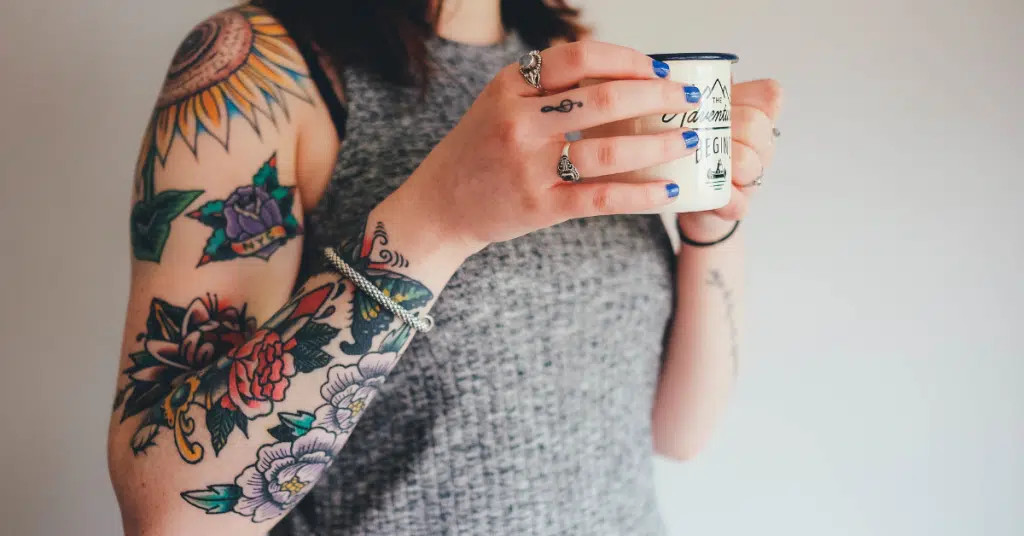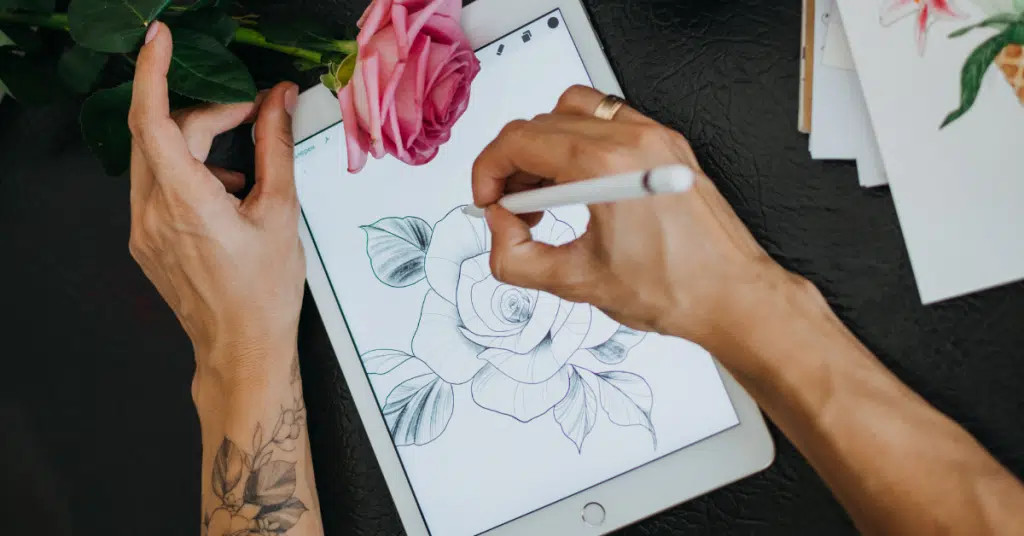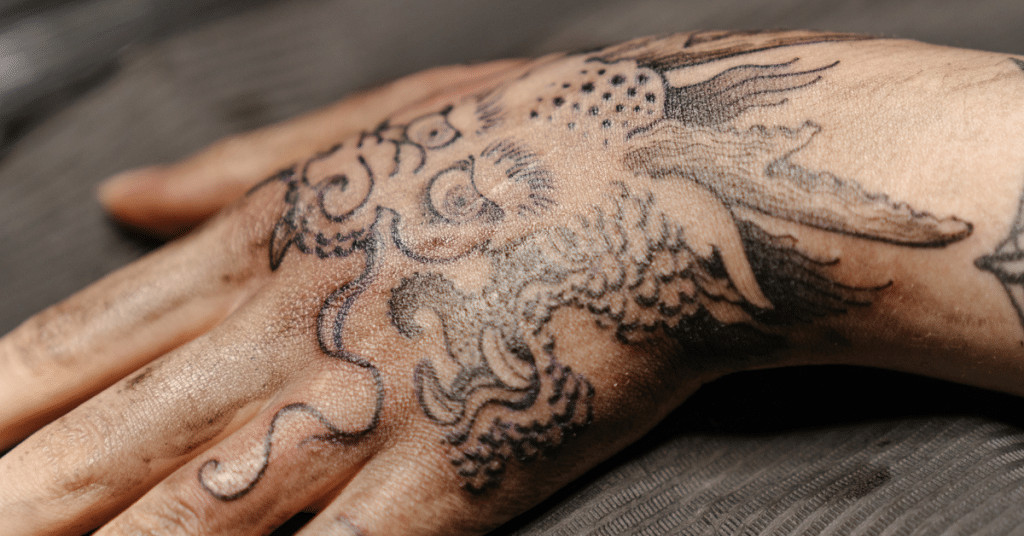Are Tattoos A Sign Of Mental Illness? At tattooat.com, we understand that body art and mental health are intricately connected, and we’re here to explore that relationship with you. Tattooing and body modification can be powerful forms of self-expression, emotional release, and personal storytelling, offering a way to navigate grief, trauma, and other complex feelings. Let’s delve into the world of ink and explore how tattoos can be a therapeutic outlet for many. Learn how the self-expression of permanent art can be a positive tool and how to find an artist who is the perfect fit.
1. The Enduring History of Tattooing
Tattooing is far from a modern fad; it’s an ancient practice with roots stretching back thousands of years. The word “tattoo” itself comes from the Tahitian term “tatau,” meaning “to strike.” In Polynesian cultures, tattoos have long symbolized power, honor, and identity. Although missionaries attempted to suppress the practice in the 1800s, it experienced a cultural resurgence in the 1980s as a proud reclaiming of heritage.
The oldest known tattoos were discovered on Ötzi the Iceman, a 5,200-year-old mummy. These markings, found around his joints and lower spine, are believed to have offered therapeutic relief rather than serving as symbols of status. This suggests that ink may have been used to alleviate pain or illness in ancient times.
In ancient Egypt, tattoos on women, dating back to as far as 4000 BCE, have sparked debate among archaeologists. While early researchers initially dismissed these women as having a lower status due to the abdominal and thigh ink, more recent perspectives suggest that their tattoos may have been symbols of status, protection, and spirituality.
Body ink is not always associated with positive meanings. Yakuza tattoos in Japan can be linked to gangs, while serial numbers were forced upon Auschwitz prisoners. However, even these marks can be seen as a testament to survival and resilience. While it’s impossible to cover every instance of tattooing in history, one thing is clear: tattoos tell stories of human existence.
In the United States, tattoos can sometimes evoke negative perceptions, such as being unprofessional in the workplace or engaging in risky behavior. However, this perception is shifting, and there’s a growing understanding of how body art can provide emotional benefits. Whether it’s a memorial portrait of a loved one or a depiction of an adorable animal, body art can be a way to move forward and find solace.
 Ötzi the Iceman tattoos believed to have offered therapeutic relief
Ötzi the Iceman tattoos believed to have offered therapeutic relief
2. How Can Tattoos Be Related to Mental Health?
Today, the vast majority of Americans believe society has become more accepting of tattoos, illustrating how mainstream they have become. Here are a few ways body art can be an impactful part of the mental health journey:
2.1. Tattoos Tell Stories
Tattoos serve as intimate ways of outwardly sharing the things and people who mean the most to us. Research indicates that a significant percentage of people with tattoos have at least one that remembers or honors someone or something. Whether it’s a reminder of a positive time or a difficult memory, body art helps us keep pivotal parts of our journey at the forefront of our minds.
Memorial tattoos, in particular, can play a significant role in the grieving process. Some people may get song lyrics, an EKG reading, or even ink infused with a loved one’s ashes to feel they are still with them. The design provides a conversation starter, giving them opportunities to share stories of their loved one and keep their memories alive.
2.2. Tattoos Promote Self-Expression
Body art, like clothing or hairstyle, is a form of expressing one’s beliefs, thoughts, or ideas. Almost half of people with tattoos say they got their ink to make a statement about what they believe in. This can play a huge role in living authentically, whether it’s expressing your sexual identity through a colored flag or showing solidarity with a community you belong to. It can help someone come into their own and connect with those around them.
Tattoos can help us express deeper feelings and a sense of belonging. People often get ink that represents someone they admire or shows their dedication to a fandom. A popular example is Ellie, a strong character from The Last of Us. The fern and moth motif on her arm has become a popular design as an empowering piece of body art for people who have scars, have overcome challenges, or relate to Ellie’s queer identity.
2.3. Tattoos Support Body Positivity and Self-Acceptance
Tattoos can be a source of autonomy, helping many people rekindle or discover a love for their bodies. Having beautiful art on your skin can bring confidence. Getting inked can be an essential part of a healing journey, giving the recipient permission to stop hiding and start feeling comfortable with who they are.
In the mental health space, it’s common to have guilt or shame associated with self-injury marks or scarring, especially as someone recovers and wants to move forward. Body art can cover or work with scars to help people forgive themselves and create something beautiful out of a dark experience.
Tattooing can also be gender-affirming. Similar to 3-D nipple tattooing done for those who have undergone mastectomies for breast cancer, people who have top surgery (breast removal as part of a gender transition) have found nipple reconstruction to be an impactful aspect of becoming who they truly are. There are tattoo artists who dedicate their work to gender-affirming tattoos, playing a vital role in the affirmation journey.
2.4. Tattoos Help To Heal From Trauma
Trauma responses are complex and can create a feeling of disconnection from one’s body. In these cases, the tattooing process can be a physical act of reclaiming the body, inherently telling the mind that what happens to them doesn’t have to be out of their control.
For people who have been victims of sexual assault, body art can be a “non-traditional form of healing,” as described in research on tattoos in relation to recovery from sexual trauma. The researchers found that many survivors seek out tattoos as a form of “regaining control of their bodies and their environment.” Body art can be one piece of the puzzle in recovering and healing.
There’s an emergence of artists in the industry who are taking a trauma-informed approach to tattooing, promoting safe spaces through consent, empathy, and understanding of clients’ diverse backgrounds and experiences. An integral part of this process involves checking in with clients to assist with the physical and emotional pain that may emerge as someone alters their body. Furthermore, there are tattoo shops that provide private spaces, have only women or queer artists, or maintain other guidelines aiming to provide an inclusive, welcoming space for tattoo seekers.
2.5. Tattoos Provide Important Reminders
Often, meaningful tattoos are inked on prominent parts of the body, so the recipient can reflect on and remember themes vital to their well-being or story. Whether it’s a reminder to breathe or a postage stamp of a meaningful family trip, body art can play a role in reminding us of what is important to us and our journey so far.
One powerful example of an ink reminder is Project Semicolon. Focused on mental health advocacy and suicide prevention, the semicolon has become a universal symbol of hope and perseverance, boldly reminding others and themselves, “My story is not over.” Researchers found that the symbolic action of getting a semicolon tattoo creates an internal shift, marking one’s survival and a new chapter in life.
 A tattoo as self-expression
A tattoo as self-expression
3. How Can Tattoos Be Considered a Form of Therapy?
Many people describe tattoos as their therapy, and as we’ve seen, ink can be a therapeutic part of living authentically and overcoming challenges. Tattooing is a very intimate and time-consuming process, so the relationship that develops between an artist and a client can be deeply rooted in trust as they share personal stories, experience pain alongside them, and communicate frequently throughout the process.
Keep in mind that tattooing can never replace the support of a mental health professional. A therapist can give you a space to explore how you feel, provide helpful coping skills, and help you reach goals that are important to your life. If you or a loved one is struggling, reach out to a primary care provider or a local psychiatric care organization for a screening that helps you determine what kind of support may be needed.
4. What Is the Difference Between Tattoos and Self-Harm?
In the context of mental health, tattoos can sometimes blur the line between what’s healthy and what may indicate a concerning behavior. Since body art causes some pain and trauma to the skin, it may seem like a form of self-harm.
Self-injury is the act of inflicting pain on oneself to bring a temporary sense of calm in reaction to extreme emotional distress. It can be a form of avoidant coping, such as a distraction or a way to feel a sense of control. Self-harm is an unhealthy coping mechanism that can lead to guilt, infections, and a higher risk of suicide.
On the other hand, getting a tattoo is usually motivated by a positive intention and deliberate decision in collaboration with a professional artist. According to experts, it would be exceedingly rare for a tattoo to be completely self-injurious. However, a self-administered stick-and-poke tattoo at home, without professional equipment, may have different intentions.
Because everything we do, even unconsciously, carries multiple meanings, it’s important to keep an open mind when it comes to others’ tattoos. Some content and placement of body art, such as on the face, can seem alarming or off-putting at first. But if you inquire about what they’re expressing through the ink, you may end up shifting your perspective.
If you’re considering getting a new tattoo and have some complicated feelings or need some direction, talk it through with someone you trust. Whether it’s a friend, parent, or even your therapist, they can offer an additional perspective to help you make intentional choices about body art.
5. Can You Become Addicted to Tattoos?
After receiving a tattoo, you may feel motivated or excited to get your next piece. The body responds to the tattooing process by releasing endorphins to manage the pain. After all, a tattoo is considered trauma to the skin, and the body reacts accordingly. So, it’s common for people to get an “endorphin high” that boosts their mood, which may become an addictive factor for some people.
Although tattoo addiction is not a clinical diagnosis, it should be taken seriously if it accompanies other reckless behavior, such as preoccupation with body art, emotional dependence, financial strain, and other signs that mimic addictions. And for people with depression, anxiety, and other mental health challenges, it’s possible for tattoos to become an unhealthy coping mechanism, providing temporary relief and distraction.
Like any activity, when tattooing is done in excess, it’s a red flag that someone may be struggling. No matter what, if you suspect someone you care about is using unhealthy coping strategies, check in with them to see how they’re doing. Having a conversation with a loved one can provide the incentive they need to get professional support.
 Multiple Tattoos
Multiple Tattoos
6. How Should You Navigate the Tattoo Discussion with a Teen?
The teen years are all about self-exploration and finding one’s identity and values. While tattooing a person under age 18 is illegal in some states, other states allow it with parental permission. As a result, tattoos are becoming increasingly popular among teens. Studies show that over half of high school students have expressed a desire for a tattoo, and nearly one-quarter of 16– to 18-year-old teens have asked their parents for permission.
The teen brain is not fully developed, which makes teens more impulsive. So, getting permanent body modification like a tattoo at an early age can lead to regrets over time. What can parents do when a teen comes to them about getting a tattoo? Here’s a breakdown in a few steps:
- Validate their interest: Immediately saying no will shut down a conversation and could cause frustration. Instead of making an immediate decision, take the time to slow down the process and talk with them about it.
- Have an open-minded conversation about what they want: Although you may have already made up your mind about how you feel about your teen getting a tattoo, hearing why they want to get it can open a window into their world. Listen closely and ask questions that show your interest. Why do they want a tattoo? What does it mean to them? Because tattoos can be deeply personal, the conversation can help you gather valuable information for navigating next steps.
- Help them explore other forms of self-expression: They might want to try a different haircut or color, try new ways of dressing or using makeup, or create art that shows how they feel. Another way to support teens is by connecting them with clubs or community events focused on topics they’re passionate about.
- Share health-related information and considerations: Informing teens of the health and aesthetic concerns that come with tattooing can support their decision-making process. For example, body art may change as they age because the skin stretches, possibly altering the design in the future. They should also know how important it is for them to take care of the tattoo as it heals to avoid infection.
- Support them in being safe: If you are comfortable moving forward with a tattoo, it’s vital to research a safe and talented artist. Many artists offer consultations prior to completing the design, which can help you feel more comfortable based on their ability, the process itself, and pricing.
The most important thing is to be there for your child as a source of unconditional support. The teenage years are tough enough already, so offering a safe, loving space, rather than judgment, will help them make healthy, well-informed decisions.
7. Mental Health Resources
It’s crucial to remember that if you’re struggling with mental health issues, seeking professional help is essential. Here are some resources that can provide support:
- National Alliance on Mental Illness (NAMI): 1-800-950-NAMI (6264)
- Mental Health America (MHA): https://www.mhanational.org/
- The Trevor Project: 1-866-488-7386 (for LGBTQ youth)
- Crisis Text Line: Text HOME to 741741
- Substance Abuse and Mental Health Services Administration (SAMHSA): 1-800-662-HELP (4357)
8. FAQ: Tattoos and Mental Health
Here are some frequently asked questions about the connection between tattoos and mental health:
8.1. Are tattoos a sign of mental illness?
No, tattoos are generally not a sign of mental illness. They are a form of self-expression and personal storytelling.
8.2. Can tattoos be therapeutic?
Yes, tattoos can be therapeutic for some people, helping them to heal from trauma, express themselves, and reclaim their bodies.
8.3. Is there a link between tattoos and self-harm?
While tattoos involve some pain, they are different from self-harm, which is an unhealthy coping mechanism used to deal with emotional distress.
8.4. Can you become addicted to tattoos?
While not a clinical diagnosis, tattoo addiction can occur when tattooing becomes an unhealthy coping mechanism or is accompanied by other reckless behavior.
8.5. How should I talk to my teen about getting a tattoo?
Have an open-minded conversation, validate their interest, and provide them with health-related information to support their decision-making process.
8.6. What are the risks associated with tattoos?
Risks include infections, allergic reactions, and scarring. It’s important to choose a reputable artist and follow proper aftercare instructions.
8.7. Can tattoos affect my career prospects?
While societal acceptance of tattoos is increasing, some employers may still have reservations about visible tattoos.
8.8. Are there any mental health conditions that might make someone more likely to get a tattoo?
There’s no direct link, but people with certain conditions like body dysmorphic disorder may have a heightened interest in body modification.
8.9. How can I find a tattoo artist who is sensitive to mental health issues?
Look for artists who are trauma-informed, create safe spaces, and prioritize consent and empathy.
8.10. What should I do if I regret getting a tattoo?
Consider tattoo removal options or explore ways to incorporate the tattoo into a new design.
9. Find Your Perfect Tattoo at Tattooat.com
Ready to explore the world of tattoos and find the perfect design to express yourself? Visit tattooat.com for a vast library of tattoo designs, a curated list of talented artists and studios across the USA, and detailed articles on tattoo processes, aftercare, and the latest trends.
At tattooat.com, we’re passionate about helping you find the ideal tattoo that reflects your unique story and personality. Whether you’re seeking inspiration, looking for a skilled artist in Portland, or want to learn more about the art of tattooing, we’ve got you covered.
Explore our website today and start your tattoo journey!
- Discover Stunning Designs: Browse our extensive collection of tattoo designs, categorized by theme, style, and body placement.
- Find Talented Artists: Connect with skilled and reputable tattoo artists and studios in your area.
- Learn Essential Knowledge: Read our in-depth articles on tattoo preparation, aftercare, and the history and cultural significance of tattoos.
Let tattooat.com be your guide to the world of ink and self-expression. Start exploring now!
(Address: 1825 SW Broadway, Portland, OR 97201, United States. Phone: +1 (503) 725-3000. Website: tattooat.com.)
